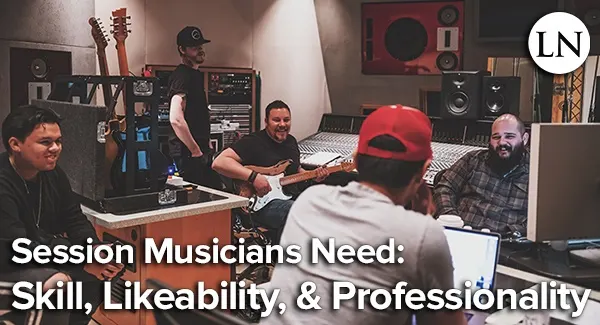
Being a session musician is still in-demand in today’s music industry. It’s a common belief that the need for a stand-in studio musician in recording sessions has decreased over the last ten years, in large due to the effects of technological advancements and shift to sample-based productions.
On the other hand, the need for session musicians in musical performances has increased, compensating for reduction in studio session work. Overall, the growth projected for the next 10 years is just slightly behind the average across all industries.
Work opportunities for musicians and vocalists are expected to increase by around 6% by 2026, according to the U.S. Bureau of Labor Statistics. To put that in perspective, the projected growth rate for all occupations in this time frame is 7%.
A session musician can be hired by anybody that needs to record music: a band, music producer, music contractor, even a video producer. Therefore, their duties vary based on a type of job he or she is hired for, but their skills remain in high demand.
In this article, we are going to cover all the basics you should know if you are seeking to become a session musician or hire one.
What is a Session Musician?
A session musician is a singer or an instrumentalist, such as guitar player, piano player, etc., hired by a band, producer, artist or record label to perform music in a studio recording session. That’s why session musicians are very often also called “studio musicians”.
During the 1950’s and 60’s, this job was very popular and almost every local scene (especially in New York, Los Angeles, and Nashville) had its session musicians they worked with on a regular basis. Of course, every one’s goal was to get into one of these “A-list” circles. They pay was high and consistent.
With growth of the music industry and globalization, a session musician’s work expanded to include supporting artists on tours as a band musician and musical performances for live events, amongst others.
What Makes a Good Session Musician?
What makes a session musician different from others is the quality of musicianship and versatility. The ability to deliver professional quality studio tracks fast, in various settings, is the cornerstone of every session musician.
Session musicians are hired only because their skills are above other musicians out there and the quality they produce is better. Those two attributes make them more expensive as well, so artists treat them as an investment into their music.
Most of these musicians specialize in playing an instrument of their choice, yet some of them are multi-skilled and can play several instruments or perform several roles, such as recording tracks, helping with arrangements, writing out scores, etc.

Apart from having the needed musical skills, “A-list” session musicians have strong interpersonal skills and maintain a professional way of behavior. In this job, it is really important to make sure that you are a person a band and recording studio would like to work with.
Be someone that is nice, easy-going, and comes to rehearsals on time. This might not seem that important, but you’ll be surprised how much people appreciate reliable and likable musicians. When time is money, professional behavior matters a lot. Let’s dive deeper.
How to Become a Session Musician?
Well, there is not an exam you can take to become a session musician, though there are university programs related to the career. It mainly requires you to be at the right place at the right time and stand out from others. Of course, networking makes a huge difference, as we’ll mention.
The only prerequisites for being a successful session musician are to be a top-notch expert in your instrument, have vast musical knowledge you can easily reference and strong understanding of music theory. There is no certification required or available.
You have to be able to improvise on the spot, to play whatever genre is needed without having any issues with it. You have to be ready (and able) to play any style of music, to cope with any type of musician, and be open to various types of session work.
The next really important step in becoming a session musician is networking. Try to get to know different players, introduce yourself and give your details out, etc. Go to different gigs and shows, watch bands and meet fellow players. Don’t be shy to reach out to local recording studios or offer your services online (check out Craiglist in a big city like New York to see this in action).
Furthermore, you should work on self-advertising online with a music marketing plan. Be present on social media or create your own website. Create a profile on Youtube or Facebook and document all sorts of things you are doing as a musician in general and specifically as a hired gun.
Think of it as an online portfolio and proof of claims on your resume that, of course, needs to be updated regularly. You’re building confidence that you are who you claim to be for your potential employers.
All these tips improve the odds of you being the right person at the right place at the right time as more people are going to be aware of you, your skills and expertise. As they say in business, be everywhere at all times (omni-present marketing).
Session Musician Jobs & Salary
Being a session musician is basically a freelance job, however it is not impossible to make a good living in this profession. The rates session musicians charge can be fixed, but more often they are hourly and, of course, depend on the musicians’ experience and expertise.
That being said, the hourly rates can range from minimum wage to a couple hundred bucks per hour. All in all – the more gigs you manage to book, the more you can earn, especially as you build relationships with the same clients over time.
As you prove your worth to a studio and all of its own clients, it becomes more valuable to pay you the higher rate you’re asking than to gamble having to bring in and build rapport with a new studio musician.
Data from the U.S. Bureau of Labor Statistics states the following earnings for session musicians:
- Median Annual Salary: $58,552 ($28.15/hour)
- Top 10% Annual Salary: $152,547 ($73.34/hour)
- Bottom 10% Annual Salary: $21,632 ($10.40/hour)
When it comes to similar professions, here’s a salary comparison chart:
- Music director or composer: $49,630
- High school (music) teacher: $60,320
- Middle school (music) teacher: $58,600
There is one thing to keep in mind if you opt-in to work as a session musician: This job usually requires some additional expenses like purchasing instruments and maintaining them, recording equipment, licenses, and travel expenses.
Session Musician Credits & Royalties
Despite the fact that session musicians work behind the scenes, they are very well-known and appreciated within the music industry. Furthermore, some of them managed to be publicly recognized like The Wrecking Crew (there’s also a documentary movie about them), The Funk Brothers or the infamous Toto.
Popularity will get you more gigs, but not necessarily income from credits and royalties.
In most cases, session musicians are paid through a Work For Hire Agreement which means that they provide a service and that they don’t have the rights to claim the copyright of the song. Major record labels, however, usually provides 1-2% royalty for a session musician who worked on a full album, sometimes even on a single track.
When it comes to live performances, a session musician co-owns the copyright of the recording.
“Co-ownership of copyright means that you have the right of consent regarding how the recording is used, whether it be for radio play, use in commercials, film or any other medium. You are also entitled to any royalties generated from the use of the recording. You will not be entitled to anything, if you have agreed to a flat session fee and signed a session musician’s release.” - explains Music Industry Inside Out.
Is Being a Session Musician Right For You?
If you decide to take your chances in this career path, without any doubts – you need to work hard. Here’s a quick reminder of what can help you along the way:
- Specialize in work you do as a musician.
- Be open-minded when it comes to music genres, ready to quickly adjust to different situations, musicians, studios etc.
- Make sure you can improvise with ease.
- Be easygoing, but professional.
- Create an (online) portfolio.
- Network!
- Make sure you are aware of your rights when signing a contract.
What’s nice is that, though you’ll be working in a local studio, you can still find clients online from all over the nation and globe to provide your services to. Passing project files around online is a piece of cake now. Do you think a career as a session musician is the right one for you?